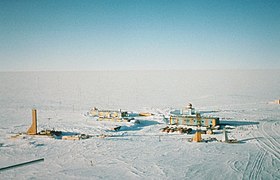It’s really quite a mystery… for the continent that reaches an astonishing freezing temperature of −89.2 °C, how are liquid lakes still present on Antartica?
The answer, surprisingly, is quite simple – the lake is underground. Below the icy glaciers of the massive White Continent lie around 300 sub-glacial lakes. Due to geothermal heat and pressure, these lakes stay cozy all year long, and form part of a massive ecosystem under the ice. Lake Vostok, the largest one of them all, has just recently been uncovered. After over 20 years of hard drilling, a Russian team has finally “broken the ice” with this 15,000 square km large body of water. This lake is absolutely enormous, and reaches depths of over 800m, even larger than Lake Ontario!
This is a huge accomplishment for the Russian team. Lake Vostok is both huge and isolated, meaning that there might be hundreds of new species evolving and devloping secluded from the outside world. With the excavation of this lake, the scientific world gains a bit more knowledge as to the mysteries of the world.

I’m not sure if that’s a good thing or not. We already have a massive amount of knowledge amongst us, but we only know so little when compared to the things unknown. When will we be able to conquer our seemingly-insatiable curiosity? I’m sorry to sound like a pessimist, but instead of looking after the millions living in poverty, we’re undertaking mad animal hunts, or digging up dirt to find old pots. I truly appreciate science. But isn’t it more important to deal with all the issues with our planet that we are already conscious of? It seems to me that the human race is investing more and more into the unknown, because finishing difficult tasks is just so offputting… why don’t we put aside world hunger and poverty to play in the dirt? The pursuit of information is captivating, and has no time restrictions. But the need to heal the world is dire.
For now, let’s all focus on the never freezing lakes of Antarctica – the rest of the world can wait.
